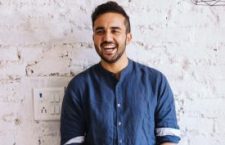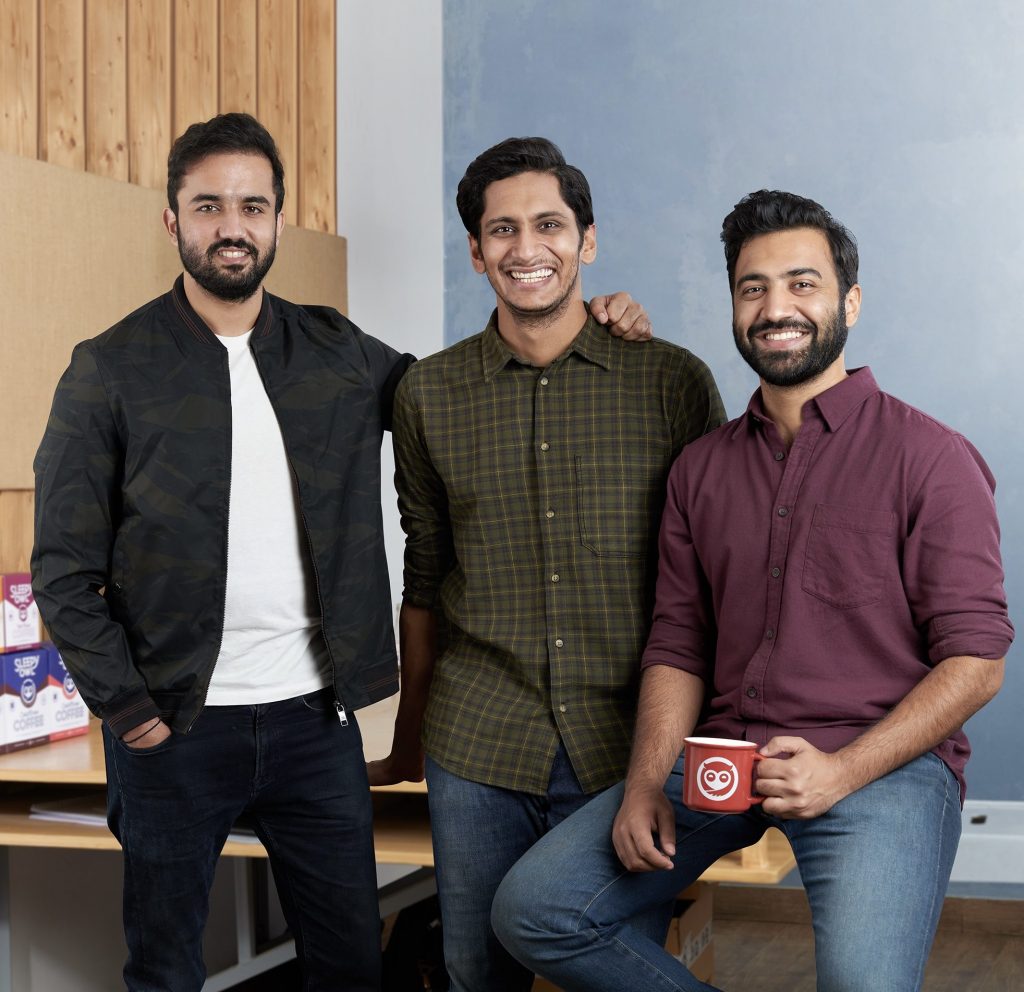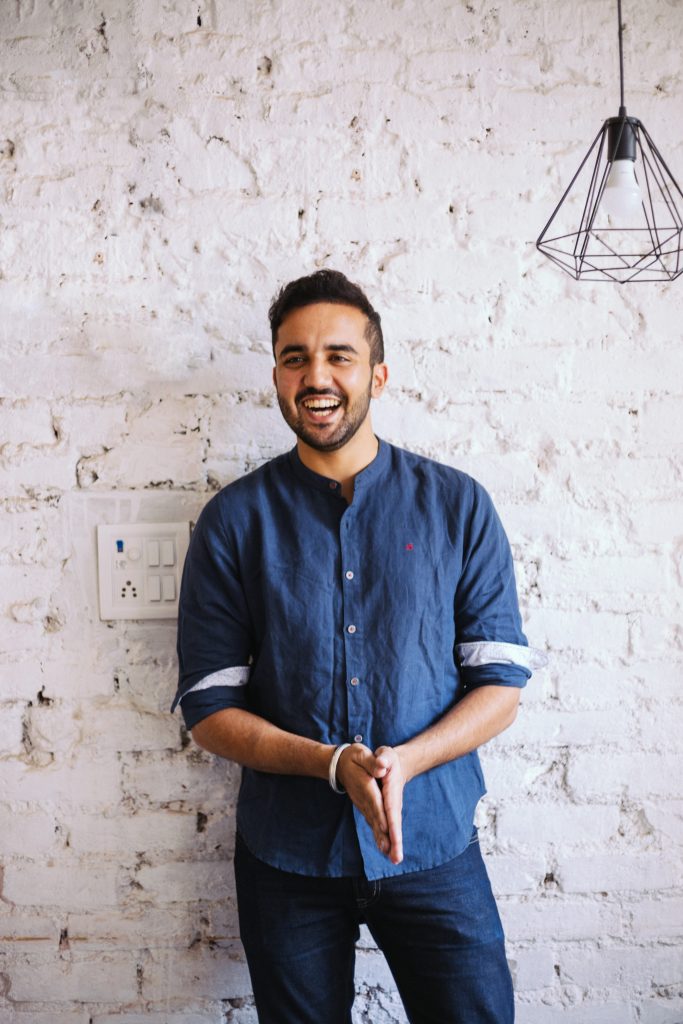
21 Dec Alumni Spotlight – Ajai Thandi ’09
Ajai Thandi, Class of 2009, gave up his corporate career as an investment banker to co-found one of India’s most popular coffee brands, Sleepy Owl Coffee. In this interview, Ajai shares how Woodstock School’s holistic educational approach helped him develop strong self analysis and multi-dimensional thinking skills. He fondly remembers his time at Woodstock and talks about his many experiences of the dorms with some of his closest friends. Featured in Forbes India’s 30 under 30 list in 2020, Ajai describes his idea of success and his company’s ongoing mission of making coffee one of the largest consumed beverages in India.
How would you describe your Woodstock experience?
I think Woodstock for me was one of the best two years of my life. I made some of my best friends at Woodstock and was fortunate to have been taught by some great teachers. I played a lot of sports, barely studied, and just had a great time in general. I was at Woodstock for two years, for eleventh and twelfth grade, and some of my fondest memories in my life are from my time at Woodstock. Some of my closest friends in life are from Woodstock and I was very grateful to have been a part of the community.
Looking back at your time at Woodstock, what would you say is your most favourite memory?
My favourite memory of Woodstock was back in twelfth grade when the dorms were getting renovated. They shifted all of us twelfth-grade boys to Rokeby Manor. We were quite the rebellious bunch. We were very far from Midlands and had no interaction with our other classmates so we would get up to mischievous things all the time. I remember a few things that were quite memorable. First, all the boys shaved their heads in protest of being put in Rokeby in our senior year instead of Hostel. One day we went to school and all the boys were bald, that was pretty funny. I believe a random guy started it and it was like a domino effect. Everyone wanted to shave their heads. Second, in twelfth grade, we were not given a Diwali break and we decided to protest against that too. We refused to leave our dorm and so the head of high school, vice-principal, principal, everyone came and asked us to go to classes but we just sat there silent. Another fond memory of mine is senior skip day. We did not have a senior skip day, but we decided as a class to get together and bunk. Some of the people that were scared went to class but the rest of us went to Flag Hill and had a great day. Most of my memories about Woodstock that I cherish are to do with having fun and the different adventurous and rebellious activities we did back then.
At Woodstock, the learning is not purely academic. You get educated holistically in a community of diverse students and teachers and that opens your mind as to what life is beyond goals, grades, jobs, and money.

What inspired you to start a coffee brewing business like Sleepy Owl Coffee?
After Woodstock, I went on to study in the United States at the University of Southern California. After that, I worked as an investment banker at JP Morgan. I guess you could say that I took a pretty traditional path in life. However, I have always liked coffee. Ever since my school days, I have had this fascination and love for coffee as a beverage. I was surprised that whenever I was home in India, the only options we had were Nescafe and the other instant coffee brands. So I felt that it was only a matter of time before the whole coffee industry changed in India. India has some of the best coffee farms and plantations in the world and we are also one of the largest exporters of coffee globally. If you are sitting in a cafe in America or Europe you can order a cup of coffee grown in India. Nonetheless, Indian consumers never really get to experience that. So I identified that as a major problem and I, as a consumer, who was always looking for a good cup of coffee at home decided that the only way to address the issue was to create my own product. I got together with a couple of my friends and we started this coffee company to just simply provide Indians with some good coffee. Luckily for us, a lot of customers rally around our product and today Sleepy Owl Coffee has become a successful brand across India.

Sleepy Owl Co-founders: Ajai Thandi, Armaan Sood and Ashwajeet Singh.
Before starting your own coffee brewing business, you mentioned that you were an investment banker at JP Morgan. Many people would call that a major career switch. How was the experience of switching careers for you and would you recommend it to others?
It really is a major career switch but at the same time, I believe that it is a matter of perspective. Once I went to college, I was more focused on my studies and goals and I really enjoyed finance as a subject. Also, after college, some of the best jobs were in banking and finance. Investment banking especially was very tough. Given that I was quite ambitious at the time, I put my head down, studied, and made sure that I reached there. Soon after achieving my goals and getting a job, I really started questioning and thinking about life. My journey in becoming an investment banker widened my perspective on life and what my purpose is and what I want to do. I feel like such things kind of come back to your early days and I do believe that Woodstock was where I originally learned to self-analyze and it is where multi-dimensional thinking was sort of instilled in me. At Woodstock, the learning is not purely academic. You get educated holistically in a community of diverse students and teachers and that opens your mind as to what life is beyond goals, grades, jobs, and money. At the point where I decided to switch, I had a choice to stick to banking and continue doing that for the rest of my life or go do something that I was truly passionate about. While I felt that I had worked very hard on my investment banking career, I would be doing a disservice to myself by continuing on it instead of focusing on my passion. From a young age, I was very entrepreneurial and I had this desire of starting and running my own company – a strong business that can create value for not only the stakeholders involved but also for society and communities at large. Once I had this clarity, I decided to move back to India and work on my life’s purpose of creating something of value, whether it is an organization, a company, or a product. That was the drive and coffee was just the means to accomplish that. In terms of recommending a career switch, I would say that it is really tough and it is not for everyone because it requires a lot of discipline, time-management and you need to be able to deal with high levels of stress. Again, it is not for everyone but it is an individual and very personal decision to make. However, if there is something out there that you are truly passionate about and you feel that you want to create a business, a product, or anything for that matter – the world is your oyster. Especially in this day and age, the only thing stopping you from achieving what you want is yourself.
From a young age, I was very entrepreneurial and I had this desire of starting and running my own company - a strong business that can create value for not only the stakeholders involved but also for society and communities at large.
Could you tell us more about your journey in setting up such a business and how you approached the risks and challenges that came with it?
Once I moved back to India, I said, you know what, I came back to start something and I am not going to rest until I have started it. Given that I had a college degree and a really solid job that I used to work in, I always knew that I had a fall-back option. Even if I failed, I could always go back to an investment banking job. Once I knew what exactly I wanted to do, every day was focused solely on achieving my goals. It had its ups and downs and its effects on my personal life but that is just a part of the process and a part of life in general. Setting up a business taught me a lesson in flexibility. Sometimes you may have an idea but it may not necessarily resonate well with your customers, your team, or what the market conditions are. I also learned the importance of feedback. You have to take feedback and accept that you do not know everything and that you have to learn as you go. In school, you get feedback from academics, grades, ranking, and report cards. Similarly, in business, you get feedback through numbers on a spreadsheet, and in life, you get it through your personal triumphs and failures. It is about how you adapt and wear your failures on your sleeve. These are the things and reminders I feel were most important to me and they are constantly needed along the way. In business, you are constantly challenged and sometimes it is important to step back and remind yourself of how far you have come so you have more clarity on your vision and mission. It also gives you the courage and confidence to continue on your journey. This is especially helpful if you feel down. If you feel arrogant, you can always compare yourself to someone doing something better than you. To summarize, focus, clarity, and determination are what helped me deal with risks and challenges while setting up my business.
Going from a day to day job to founding a business must have had a huge impact on your personal life. Could you tell us about any changes in your lifestyle and quality of life? And do you prefer one lifestyle over the other?
Running a business is a 24/7 job. There are two things to it. First, you have absolute control over your time and it is the best feeling in the world. Second, when you are running a business, you are the captain of your ship and you need to be paying attention and plugged in all the time. It is an oxymoron per se. Whereas in a job, you clock in, you clock out, you make sure your work is complete, it becomes very dull. For me, my business does not feel like work. It is just life. If I am not doing it then I feel like something is wrong. I love what I do, every single morning I wake up and I am excited about it. Whether it be tough times or easy times, I always say bring it on and that I will deal with it. It is a major transition, from being on a day to day grind to being plugged in all the time. But the best thing about being an entrepreneur is freedom and nothing is greater than freedom of time.

Can you share with us one key life lesson you learnt at Woodstock that has been helpful to you and your career/business?
The key life lesson I learned at Woodstock is to not take yourself too seriously. Life will in itself give you enough opportunities where you will need to be serious, stressed, and tense. You can either choose to deal with it with a smile on your face or you can choose to do it with anger and aggressiveness. Woodstock had this idea of life where you could get through most things without being too serious and wound up. Focusing on the task at hand, giving it a hundred per cent, and not worrying about anything else. This lesson has been incredibly helpful and even just knowing that most things will take care of themselves allows you to live without stress and anxiety.
You are on the Forbes 30 under 30 list and so I’d just like to ask – what does success mean to you, and would you describe yourself as successful?
To be honest, success to me means happy customers. The greatest joy I feel is when people come and tell me, “hey, I started drinking coffee because of Sleepy Owl” or “hey, I always have your coffee stocked up at home”. At the end of the day, as the founder of Sleepy Owl Coffee, I am on a mission. A mission to make more and more Indians drink coffee. We are not a coffee-drinking country, we are a tea-drinking country. So that is my fundamental goal and anytime I hear from customers that they enjoyed the products we sell… nothing is sweeter than that. Also, no, I do not describe myself as successful. I feel like my hard work has paid off in certain aspects but I still have a long way to go. At the end of the day, what we are trying to do is make coffee one of the largest consumed beverages in India. Our mission will also benefit coffee farmers and plantations across the country and that is something we are focused on. So, once again, I still believe that I have a long way to go before I consider myself successful.
If you could offer one piece of advice to students currently at Woodstock, what would it be?
You are living the best days of your life. No matter what anyone tells you and no matter what you tell yourself, make sure that you cherish your time at Woodstock. Enjoy every moment and go out there and make memories. This time is not going to come back. Be naughty, be adventurous, make mistakes, do not be afraid of failure – everything will make sense in the end. Just continue to have fun.
Interview and Editing: Jayant, Class of 2023






KirtiKant
Posted at 09:11h, 01 MarchWishing you all the success.
Kirti Kant Gupta